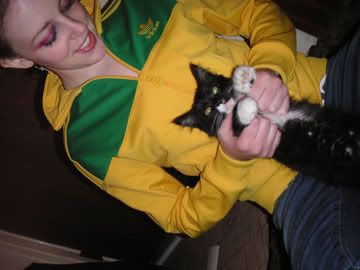I was really diggin' this book in the beginning. Typical Robbins humor, wit, and intelligence focused on a strong female lead. Sissy Hankshaw was born to a poor Richmond, Virginia, family—the only girl—and she has enormous thumbs. We're talking so large she has to wear zippered jumpsuits, for she can't operate a button. So large her father makes an aside that she'd make a good hitchhiker. Young Sissy, not understanding the intention of the statement, does just that.
But you know what? Sissy is the best damned hitchhiker there is, ever was, and ever will be. Her thumbs attract vehicles and drivers of all types. They're as hypnotizing as Biggie's words. Anyway, meeting the late-twenties master hitchhiker is when the plot really begins. I loved Sissy at this point, because she did what she wanted, whenever she wanted, pausing only to star in feminine hygiene advertisements (thumbs obscured, of course). What a role model! I remember writing a review on Robbins before, and a friend commenting that he was a great writer but sexist. That statement was plaguing me while reading Cowgirls, because I hadn't ever considered him sexist. Yes, he certainly objectifies women, but it's more than that; it's glorification. Any of Robbins' novels I've read mention as much cunnilingus, vagina musk, female masturbation, lesbianism, and powerful sexuality as lady-penned groundbreakers Fear of Flying or Rubyfruit Jungle. His use of raw feminine reality isn't exploitative or forced, and I really appreciate that about the guy. Sexist? Still don't think so. Sure, I could point out little things, like Sissy deciding to get married (but c'mon, it's mostly because she has a Native American fetish) or that Sissy is extraordinarily beautiful, aside from the thumbs (unfortunately, ugly girls star in nothing. Never talk to me about sitcoms). Ultimately, I think this novel celebrates women—especially cowgirls.
So what, exactly, is a cowgirl? And why would you want to read this novel, knowing only that it stars a big-thumbed beauty and sex? In typical fashion, Robbins weaves in plenty of philosophy (Brought to you buy the Chink, who is Japanese, and his clockworks), modern thought (marriage is a plum deal for men, not women, p. 73), and a graphic revenge story (Sissy utilizes her thumb on a pervert, in a different way than one would imagine, p. 315). These three threads I mentioned are just a few of many. God, I am such a fangirl, but man, does Robbins produce a high-quality sheet. FOCUS KRISTINA.
I recommend reading this book as I would any other Robbins novel, because it is good for people who like to think and laugh, preferably at the same time. If you like to do neither, or only separately, I don't want to consort with you anyhow. A few paragraphs ago I mentioned how I really liked this novel at first, which is true. By the end, it wasn't that I liked it less, but that I was disappointed in a few of Sissy's actions (violence towards her benefactor, the Countess, and her decision to conform to society's ideals of beauty). The first shocked me, and the second left me agape. But upon further reflection, I'm glad Robbins threw a couple of wrenches in there, doing the whole "make characters screw up so they seem more real" thing. But all's well that ends well, and the theme of Cowgirls remains one of nonconformity. Conform? Don't do it! We are all beautiful, monstrous thumbs and all.
And as far as cowgirls go, they are just that: women who work on a ranch. Jellybean Bonanza is the cutest cowgirl you'll ever see (in Robbins' words), underage and achieving her life's dream. She bucked trends and did what she wanted her whole life, packing a couple of six-shooters and riding horses. And that's just Jelly. We won't go into the metaphorical here; just imagine a group of hot, horny women running The Rubber Rose Ranch (named after the bestselling douchebag) and protecting the last flock of whooping cranes with everything they've got.
I could go on, but I won't. Chances are, you haven't even read this far. I will leave you with something to chew on, for this bit amused (in the thinking and laughing way) my reading partner and me.
"...But let me give you this caution, Sissy, my podner: Love is dope, not chicken soup."
When Sissy continued to look puzzled, Jelly added, "I mean, love is something to be passed around freely, not spooned down someone's throat for their own good by a Jewish mother who cooked it all by herself" (168).
KK
Next up: The Death of Bunny Munro (yes, Jim, finally).
